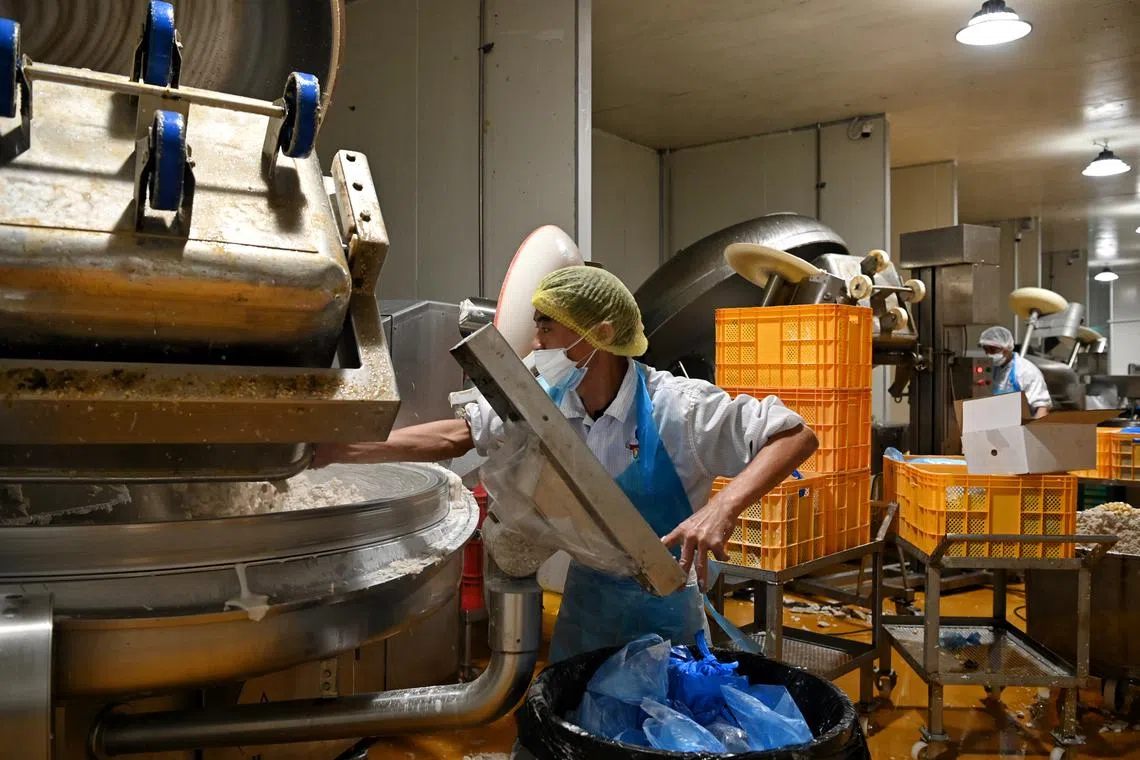Less-educated young workers in lower-wage jobs face job mobility and training challenges: NUS study
Sign up now: Get ST's newsletters delivered to your inbox

Workers of different education levels had unequal sources of funding for training, according to the study.
ST PHOTO: KUA CHEE SIONG
Follow topic:
SINGAPORE - Less-educated young workers in lower-wage jobs are less likely to take up training, or benefit as much as their white-collar counterparts in their job search process, a study by a team of researchers from the National University of Singapore (NUS) found.
This is despite evidence that training contributes to an increase of around 20 per cent in wages
The researchers looked at the work experiences of young, low-income Singaporeans aged 21 to 40.
The team behind the study presented its findings on topics ranging from work-family conflicts to mental well-being, to job wage differences and gig workers, on Wednesday at a symposium at NUS.
Principal investigator Irene Ng said the data collected from about 1,400 respondents across two “waves”, or periods, from 2020 to 2022 aimed to understand the realities of the young working poor who might otherwise become the “future poor old” in need of social assistance.
Workers of different education levels had unequal sources of funding for training, according to the study.
Those with lower education levels tended to rely more on government funding for training.
About 64 per cent of respondents with a diploma and about 69 per cent of those with a degree had their training sponsored by employers. In comparison, only 46 per cent of those with post-secondary education and about 41 per cent of those with secondary education and below had employers who paid for their training.
Associate Professor Ng, who is from NUS’ Department of Social Work and is the steering committee chair of SSR, said socio-economic status is an important factor to target in order to close training gaps. This is because of the lower participation but greater training benefits to lower-educated, non-professional, managerial, executive and technical (non-PMET) workers.
But she cautioned that training, if done only because people need paper qualifications before they can receive higher wages, could lead to an endless paper chase.
Associate Professor Vincent Chua, another researcher on the team who studied the role of social capital – the strength of one’s social network and community – in contributing to wage differences, said experienced PMETs benefited more from their social networks compared with non-PMETs.
Based on a subset of 304 employed workers, the study found that both PMETs and non-PMETs were able to land jobs through personal contacts or their social networks, but there were significant differences in returns between both groups.
Wages for PMETs in subsequent jobs that they secured through this method were about 2.5 times higher than in their first job, compared with an increase of about 1.5 times for non-PMETs.
Prof Chua attributed this gap to the differences in wage structures across jobs, and in particular, limited wage progression prospects in non-PMET work.
He noted that the wage structure of non-PMET jobs must continue to improve through the expansion of the Progressive Wage Model (PWM) to all low-wage jobs eventually, so that workers can climb the wage ladder.
Manpower Minister Tan See Leng, who was the guest of honour at the event, called 2023 a “milestone year” in Singapore’s journey to uplift lower-wage workers.
The suite of recent Progressive Wage moves, from the Progressive Wage Mark accreditation scheme for businesses to the Food Services PWM, among others, will benefit up to nine in 10 full-time lower-wage workers, significantly more than one in 10 a few years ago, he said.
“With the introduction of the Waste Management PWM in July, all the recommendations of the Tripartite Workgroup on Lower-Wage Workers will be implemented.”
The group had in 2021 made 18 recommendations to boost the wages of such workers, including expanding progressive wages to more sectors and requiring firms that employ foreign workers to pay at least the local qualifying salary of $1,400 to all local workers.
Dr Tan said that besides supporting workers to upskill and reskill, the aim is also to build a more inclusive labour market that rewards mastery of skills in different areas, with multiple pathways to success.
“We are partnering NTUC to look at how we can redesign skilled trades to offer better salaries and clearer career and skill progression ladders. We will share more details when the Forward Singapore exercise concludes.”
Forward Singapore is a year-long public consultation launched in June 2022 by the country’s fourth-generation team of political leaders to chart a road map for Singapore for the next decade.
Speaking to the media, Prof Ng said one main finding from the study is that low-income and less-educated young people face different challenges from their peers who are more highly qualified, both in terms of job mobility and mental health. “So policy responses for this group of young people should be different from the general population,” she added.


